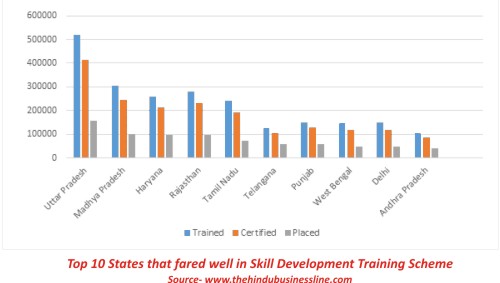Does Skilling Essentially Lead to Employment?
In
the current scenario, it is quite evident that there is a considerable rise
in growth of vocational training centres, skill training centres and other
such facilities in different parts of the country. This has led to a
significant increase in number of youth trained in different skills
throughout the country complementing the ‘Skill India’ mission. Having said
that, the objective of creating skilled manpower needs to be linked with
corresponding employment opportunities for youth, without which it will be
difficult to address the challenge of unemployment among skilled and
unskilled youth in India. Skilling cannot be considered as a solution of
un-employment until it is backed up with a focused approach towards income
generation. The statistics of placement in skill development industries
state that half of the trained youth are still unemployed. There exists a
constant struggle to place and link candidates with right opportunities. The
agencies which are in the business of skill development are constantly
struggling on different fronts to place their skilled candidates. The
challenges are as follows:
a) Mobilisation - It is imperative to have the right batch of candidates enrolled in the training institutes who are skilled, aspirational and have the right attitude towards career building.
b) Enabling industry linkages for job placements - Fostering connects with the industry for placements is a tricky business especially since India has more number of job ready candidates than the actual job opportunities.
c) Lack of counselling - Candidates are not being provided with proper counselling during their skill training courses about the vast opportunities of employment available for them. This leads to lowering of their motivation and belief in the skills they are acquiring.
d) Post-placement tracking - For employers, hiring blue collar workforce hailing from rural and semi urban areas, retention is a critical concern. From sudden change of work environments (from informal to formal set up), workload, change of lifestyle and migration from home district are some of the critical reasons behind poor retention.
In an ideal scenario, placements would strongly influence entire training component, from the candidate’s mobilisation, to training methodology, quality of trainers, industry partnerships and also understanding the needs of local employers. All employers would need to participate at each stage of planning, designing and execution. On the ground level, it shows that very few training providers have done this.
Over and above, it seems that the process of skilling does not entail employment in a comprehensive manner. One of the major reasons is the unwillingness of candidates to put their skills in different jobs.
Sometimes, the candidates join certain courses just for the sake of it and are not bothered much about the kind of opportunities they will be availing further. Their expectations in terms of the profile, logistical arrangements and remuneration may not always match with the opportunity they seek which leads to poor retention rate and waste of resources which have been put in.
Hence, there lies an urgent need of taking certain steps in order to generate quality placements and giving skills their due. For instance, Training Providers need to strategise their plan for ensuring productive placement and reflect it in the organisational structure at the national / state / district level, rather than leaving placement activities in the hands of Centre Managers or Counsellors. Training facilities should create partnership with different employers. Moreover, the candidates in skill development institutes and vocational training centres should be given more exposure to the professional world through industry visits, guest lectures, short internships etc. Taking up these measures would positively contribute towards realisation of ‘Skill India’ dream.■
Abhinav Gupta & Vishakha
Mittal
akgupta@devalt.org, vmittal@devalt.org